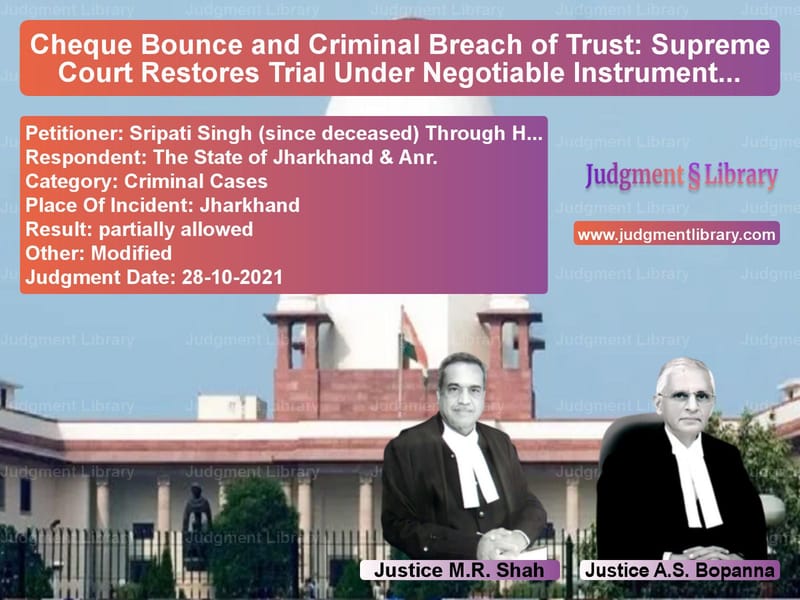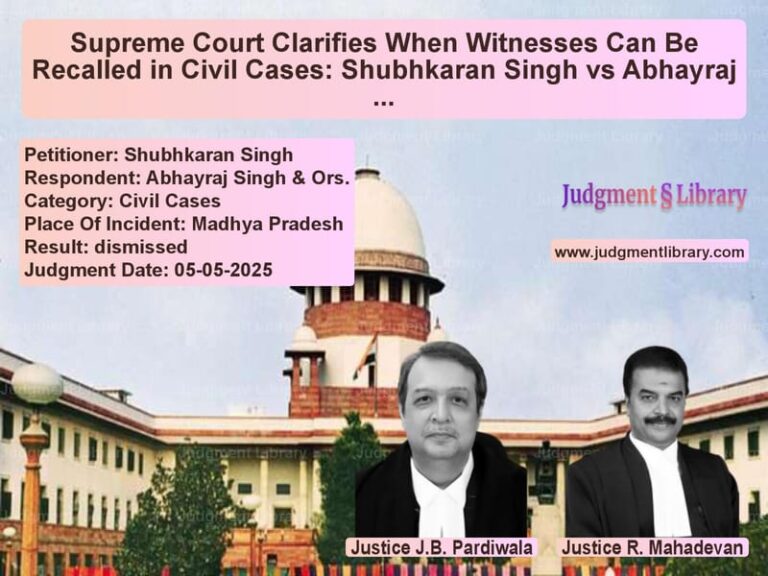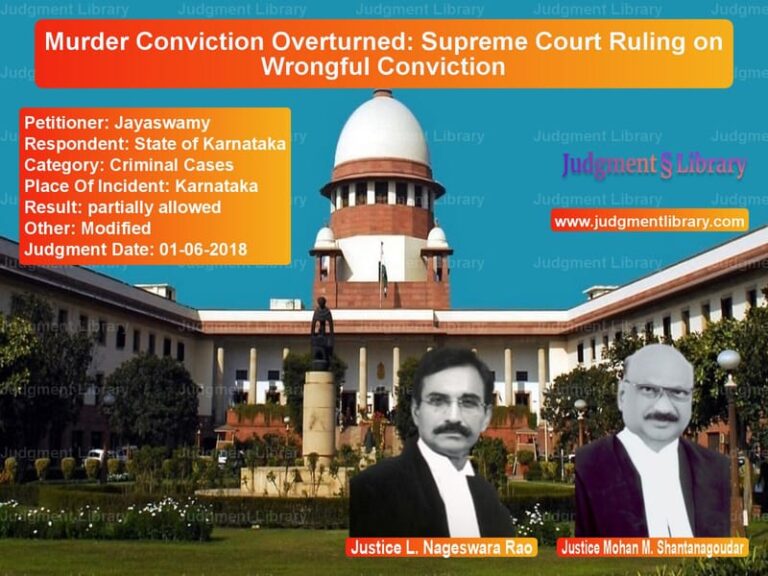Cheque Bounce and Criminal Breach of Trust: Supreme Court Restores Trial Under Negotiable Instruments Act
The Supreme Court of India recently ruled in the case of Sripati Singh (since deceased) Through His Son Gaurav Singh vs. The State of Jharkhand & Anr., wherein the issue revolved around the dishonoring of cheques and the allegations of cheating. The ruling reinstated criminal proceedings under the Negotiable Instruments Act, 1881 (N.I. Act), while quashing charges under Section 420 of the Indian Penal Code (IPC).
Background of the Case
The case originated from a business transaction between the appellant, Sripati Singh (later represented by his son, Gaurav Singh), and the respondent, who was known to the family due to an earlier acquaintance. The respondent had borrowed ₹2 crore from the appellant for business purposes and had issued post-dated cheques to ensure repayment. However, when these cheques were presented for clearance, they were dishonored due to insufficient funds.
The appellant initiated criminal proceedings under both Section 138 of the N.I. Act (cheque dishonor) and Section 420 of the IPC (cheating). The Judicial Magistrate took cognizance of the matter and issued summons to the respondent. The respondent then sought discharge from the case, arguing that the cheques were issued as ‘security’ and did not constitute a legally enforceable debt.
The High Court of Jharkhand allowed the discharge petition, quashing the criminal complaint on the grounds that the case merely involved a business loan dispute and did not attract the provisions of the IPC.
Petitioner’s Arguments
The appellant challenged the High Court’s ruling before the Supreme Court, contending that:
- The respondent had taken advantage of a personal relationship to obtain a significant loan and later dishonored the cheques issued as repayment.
- The loan agreements and issuance of cheques demonstrated that a legally recoverable debt existed, making Section 138 of the N.I. Act applicable.
- The dishonor of cheques, despite assurances of repayment, amounted to an intention to cheat from the outset, thereby attracting Section 420 of the IPC.
- The High Court erred in treating the dispute as a mere civil matter, disregarding the criminal implications of issuing cheques without sufficient funds.
Respondent’s Arguments
The respondent countered the claims, arguing that:
- The business transaction was purely financial and did not involve any fraudulent intention.
- The cheques were issued as ‘security’ for the loan and were not meant to be presented for immediate payment.
- The dispute, at best, warranted civil proceedings for recovery of the amount rather than criminal prosecution.
- The High Court correctly ruled that the absence of ‘mens rea’ (criminal intent) meant that Section 420 of the IPC was inapplicable.
Supreme Court’s Analysis
The Supreme Court examined two key issues:
1. Was the Complaint Under Section 420 IPC Justified?
The Court observed that for a charge of cheating under Section 420 IPC to be sustained, the complainant must establish that the accused had fraudulent intent at the time of borrowing money. In this case, the Court found no prima facie evidence that the respondent had any intent to cheat when he obtained the loan.
The judgment stated:
“The mere dishonorment of the cheque cannot be construed as an act on the part of the respondent with a deliberate intention to cheat, and the mens rea in that regard cannot be gathered from the point the amount had been received.”
Consequently, the Court upheld the High Court’s decision to quash the Section 420 IPC charge.
2. Does the Case Fall Under Section 138 of the N.I. Act?
The Supreme Court ruled that the High Court erred in dismissing the complaint under the N.I. Act. It held that when cheques are issued as ‘security’ but the underlying debt remains unpaid, they still constitute a legally enforceable liability.
The Court cited previous rulings, particularly Sampelly Satyanarayana Rao vs. Indian Renewable Energy Development Agency Ltd., stating:
“A cheque issued as security pursuant to a financial transaction cannot be considered as a worthless piece of paper under every circumstance.”
The judgment clarified that:
- When a borrower issues a cheque and agrees to repay by a certain date, the cheque remains valid for presentation if the borrower fails to repay otherwise.
- The concept of a ‘security cheque’ does not automatically negate liability under the N.I. Act.
- Since the repayment period had elapsed and the cheques were dishonored, a criminal offense under Section 138 was made out.
Judgment and Conclusion
The Supreme Court set aside the High Court’s decision and reinstated criminal proceedings under Section 138 of the N.I. Act. However, it upheld the quashing of the Section 420 IPC charge.
The ruling reaffirmed the principles that:
- Merely issuing a cheque as security does not exempt the drawer from liability under the N.I. Act.
- A business dispute does not automatically constitute a criminal offense unless fraudulent intent is proven.
- The dishonor of a cheque, even if initially issued as security, can still attract criminal liability if the underlying debt remains unpaid.
The case serves as a crucial precedent for matters involving business transactions, post-dated cheques, and dishonor under the Negotiable Instruments Act.
Judges: The judgment was delivered by M.R. Shah and A.S. Bopanna.
Petition Result: Partially Allowed
Petitioner Name: Sripati Singh (since deceased) Through His Son Gaurav Singh.Respondent Name: The State of Jharkhand & Anr..Judgment By: Justice M.R. Shah, Justice A.S. Bopanna.Place Of Incident: Jharkhand.Judgment Date: 28-10-2021.
Don’t miss out on the full details! Download the complete judgment in PDF format below and gain valuable insights instantly!
Download Judgment: sripati-singh-(since-vs-the-state-of-jharkha-supreme-court-of-india-judgment-dated-28-10-2021.pdf
Directly Download Judgment: Directly download this Judgment
See all petitions in Fraud and Forgery
See all petitions in Cheque Dishonour Cases
See all petitions in Judgment by Mukeshkumar Rasikbhai Shah
See all petitions in Judgment by A. S. Bopanna
See all petitions in partially allowed
See all petitions in Modified
See all petitions in supreme court of India judgments October 2021
See all petitions in 2021 judgments
See all posts in Criminal Cases Category
See all allowed petitions in Criminal Cases Category
See all Dismissed petitions in Criminal Cases Category
See all partially allowed petitions in Criminal Cases Category







